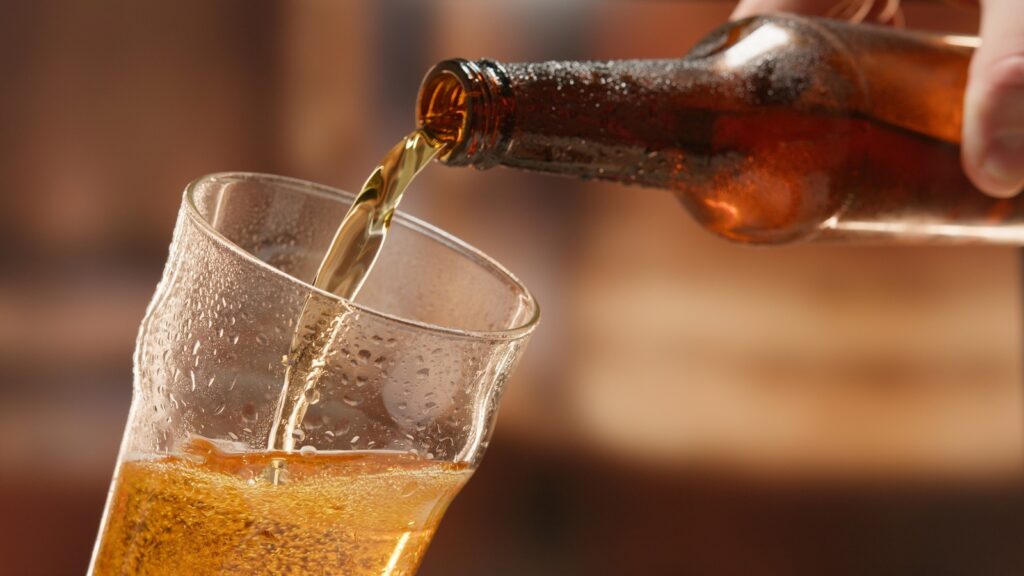


Beer is a popular alcoholic beverage that is consumed by millions of people worldwide. It is made by fermenting grains, such as barley, hops, and yeast. It is known for its unique taste and ability to bring people together. However, many people are concerned about impacts of beer on cholesterol levels, and whether they should drink or not. In this article, we will take a closer look at the connection between beer and cholesterol. We provide some additional information to help answer the question, “To beer or not to beer?“
Before we dive into the connection between beer and cholesterol, it’s important to understand what is cholesterol? Cholesterol is a waxy substance that is found in your blood and is necessary for your body to function properly. However, too much cholesterol can be harmful and lead to health problems such as heart disease and stroke. There are two types of cholesterol – high-density lipoprotein (HDL) and low-density lipoprotein (LDL). HDL is commonly referred to as ‘good’ cholesterol, while LDL is ‘bad’ cholesterol’.

The relationship between beer and cholesterol is complex and has been the subject of many studies over the years. Some studies have shown that moderate beer consumption can increase levels of HDL cholesterol, which can help to remove LDL cholesterol from your bloodstream. This is because beer contains antioxidants called polyphenols, which can help to reduce inflammation and improve the functioning of the blood vessels.
However, other studies have shown that drinking alcohol can increase levels of LDL cholesterol. This can lead to the buildup of plaque in your arteries and increase your risk of heart disease. This is because beer contains carbohydrates, which can lead to weight gain and an increase in LDL cholesterol.
Overall, the relationship between alcohol and cholesterol is not straightforward and can vary from person to person. Note that factors such as genetics, diet, and lifestyle choices can all play a role in cholesterol levels.
Beer consumption not only impacts cholesterol levels but also causes changes in triglyceride levels, which are a type of fat present in your blood and can increase your risk of heart disease if their levels are high. Studies have shown that drinking beer can increase triglyceride levels, particularly in men. However, the impact can vary depending on factors such as type of beer consumed and individual’s overall diet and lifestyle.
As mentioned earlier, the carbohydrates found in beer can contribute to weight gain, which in turn can lead to an increase in LDL cholesterol levels. Additionally, excessive alcohol consumption can also interfere with your body’s ability to burn fat, making it harder to lose weight. If you are concerned about your weight and cholesterol levels, it may be helpful to limit your alcohol consumption and focus on making healthier dietary and lifestyle choices.
Moderate beer consumption has been associated with a range of health benefits, although excessive consumption of beer can lead to health problems. For example, beer contains a variety of vitamins and minerals, including B vitamins and potassium, that can support your overall health. Additionally, the polyphenols found in alcohol have antioxidant properties that can help to protect your cells from damage and reduce your risk of certain types of cancer.
If you are looking for alternatives to beer that can help to manage your cholesterol levels, there are a variety of options available. For example, red wine has been shown to increase levels of HDL cholesterol, while also containing antioxidants that can support cardiovascular health. Non-alcoholic beers are also low-calorie option that can provide the flavor of beers without the negative health impacts associated with alcohol consumption.
When it comes to beer and cholesterol, moderation is key. The American Heart Association recommends that men limit themselves to no more than two alcoholic drinks per day, while women should limit themselves to no more than one alcoholic drink per day. This is because excessive alcohol consumption can lead to a range of health problems, including an increase in cholesterol levels.
If you are concerned about your cholesterol levels, there are other steps you can take to manage them. For example, making changes to your diet, such as reducing your intake of saturated and trans fats, can help to lower your LDL cholesterol levels. Exercise is also an important factor in managing cholesterol levels, as regular physical activity can help to raise your HDL cholesterol levels and improve your overall cardiovascular health.
Alcohol consumption can have several disadvantages, including:
The connection between beer and cholesterol is complex. There is no one-size-fits-all answer to the question, “To beer or not to beer?”. While moderate beer consumption can provide certain health benefits, excessive consumption can lead to a range of health problems. These are including an increase in cholesterol levels. Additionally, limiting alcohol consumption and exercising regularly, can help to support your overall health and manage cholesterol levels.
Also Read:
Can High Cholesterol Cause Headaches and Dizziness?
What are early warning signs of thyroid problems?
Hypothyroidism and High Blood Pressure: Causes, Symptoms, and Treatment